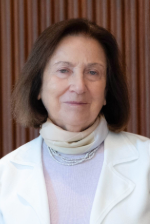Prize Recipients
The Kimberly Prize in Biochemistry and Molecular Genetics, made possible by Kimberly Querrey in honor of her late husband Lou Simpson, is awarded every year to a scientist who has made outstanding research contributions into the molecular basis of life with a direct demonstrated link of their discovery into clinic for the betterment of humankind. This annual prize is given by the Simpson Querrey Institute for Epigenetics and administered by Northwestern University Feinberg School of Medicine.
2026
Svetlana Mojsov, PhD
 Svetlana Mojsov, PhD, is the Lulu Chow Wang and Robin Chemers Neustein Research Associate Professor at the Rockefeller University, New York. Mojsov received the prize for her discovery of glucagon-like peptide 1 (GLP-1), an incretin hormone produced by gut tissue that plays a key role in insulin secretion and glucose metabolism. Her work has been translated into widely used treatments for diabetes and weight loss. Through her decades-long commitment to peptide science and glucose metabolism, Mojsov’s career has been defined by scientific rigor and transformative discovery.
Svetlana Mojsov, PhD, is the Lulu Chow Wang and Robin Chemers Neustein Research Associate Professor at the Rockefeller University, New York. Mojsov received the prize for her discovery of glucagon-like peptide 1 (GLP-1), an incretin hormone produced by gut tissue that plays a key role in insulin secretion and glucose metabolism. Her work has been translated into widely used treatments for diabetes and weight loss. Through her decades-long commitment to peptide science and glucose metabolism, Mojsov’s career has been defined by scientific rigor and transformative discovery.
In her tenure at Massachusetts General Hospital and Harvard Medical School, Mojsov’s research led to the identification of GLP-1 as a potent incretin hormone with therapeutic potential for type 2 diabetes. Her studies demonstrated that GLP-1 stimulates insulin secretion and lowers blood glucose levels, findings that catalyzed the development of GLP-1 receptor agonists, including liraglutide and semaglutide. These medications have revolutionized the treatment of diabetes and obesity.
Mojsov’s scientific achievements have earned her numerous accolades, including the Lasker-DeBakey Clinical Medical Research Award, the Breakthrough Prize, the Pearl Meister Greengard Award, the Warren Triennial Prize, and election to the National Academy of Sciences. Her research has been recognized internationally with honors such as the Princess of Asturias Award, the Tang Prize, the VinFuture Prize for Innovation from Vietnam, and the BBVA Foundation Frontiers of Knowledge Award.
2025
Ron Evans, PhD
 Ron Evans, PhD, professor and director of the Gene Expression Laboratory and March of Dimes Chair in Molecular and Developmental Biology at the Salk Institute for Biological Studies. He received the prize for his fundamental discovery and characterization of nuclear hormone receptors and their applications for drug development and human health. He is known for his pioneering discovery of the nuclear receptor superfamily. This discovery unified endocrine physiology as a fundamentally new field, advancing our understanding of transcription networks and identifying previously unknown nuclear receptors and ligands. This ultimately led to the development of new drugs to treat human illnesses ranging from leukemia to liver disease, inflammation, type 2 diabetes mellitus and cancer.
Ron Evans, PhD, professor and director of the Gene Expression Laboratory and March of Dimes Chair in Molecular and Developmental Biology at the Salk Institute for Biological Studies. He received the prize for his fundamental discovery and characterization of nuclear hormone receptors and their applications for drug development and human health. He is known for his pioneering discovery of the nuclear receptor superfamily. This discovery unified endocrine physiology as a fundamentally new field, advancing our understanding of transcription networks and identifying previously unknown nuclear receptors and ligands. This ultimately led to the development of new drugs to treat human illnesses ranging from leukemia to liver disease, inflammation, type 2 diabetes mellitus and cancer.
In 1985 Evans' lab elucidated the complete structure of the human glucocorticoid receptor, which led to the discovery of a nuclear receptor superfamily for steroids, vitamins A and D, thyroid hormone, bile acids, fatty acids and cholesterol metabolites. These hormones activate transcriptional networks that control sugar, salt, calcium and fat metabolism, thereby influencing our daily health as well as treatment of disease.
Evans received the Albert Lasker Basic Medical Research Award in 2004, and most recently, the 2024 Japan Prize in Medical Science and Pharmaceutical Science, as well as many others. He is listed by the Institute of Scientific Information as one of the 10 most cited scientists of the past two decades.
2024
Craig Crews, PhD
 Craig Crews, PhD, is the John C. Malone Professor of Molecular, Cellular and Developmental Biology and professor of Chemistry, of Pharmacology, and of Management at Yale University, where he is also executive director of the Yale Center for Molecular Discovery. He received the prize for his pioneering work in the pharmaceutical field of targeted protein degradation. He has led the development of the anti-cancer drug carfilzomib (KyprolisTM) for the treatment of relapsed or refractory multiple myeloma and for spearheading the development of PROTAC (proteolysis-targeting chimeras) drugs, which use heterobifunctional molecules — molecular homing devices fused to cellular protein adapters — to target specific proteins for destruction by the cell’s proteasome. Crews is credited with bringing PROTAC-based drugs into clinical trials, which could be used to treat an array of human diseases, including cancer.
Craig Crews, PhD, is the John C. Malone Professor of Molecular, Cellular and Developmental Biology and professor of Chemistry, of Pharmacology, and of Management at Yale University, where he is also executive director of the Yale Center for Molecular Discovery. He received the prize for his pioneering work in the pharmaceutical field of targeted protein degradation. He has led the development of the anti-cancer drug carfilzomib (KyprolisTM) for the treatment of relapsed or refractory multiple myeloma and for spearheading the development of PROTAC (proteolysis-targeting chimeras) drugs, which use heterobifunctional molecules — molecular homing devices fused to cellular protein adapters — to target specific proteins for destruction by the cell’s proteasome. Crews is credited with bringing PROTAC-based drugs into clinical trials, which could be used to treat an array of human diseases, including cancer.
He is the co-founder of Proteolix, Inc., whose proteasome inhibitor KyprolisTM received FDA approval for the treatment of multiple myeloma, the founder of Arvinas, Inc., the first biotechnology company to bring PROTAC drugs into clinical trials, and the founder of Halda Therapeutics, focused on experimental medicines for cancer.
Crews has received several other recent prizes for his research including the Gabbay Award for Biotechnology and Medicine in 2023, the Scheele Prize in 2021, the Heinrich Wieland Prize in 2020, along with many other awards.
2023
Jennifer A. Doudna, PhD
 Jennifer A. Doudna, PhD, is the Li Ka Shing Chancellor’s Chair and professor in the Departments of Chemistry and of Molecular and Cell Biology at the University of California, Berkeley. She is the inaugural recipient of the Kimberly Prize for her fundamental biochemical studies providing molecular insight into the function of CRISPR/Cas systems as tools for genome editing and the application of her work to biology and medicine. This powerful technology enables scientists to change DNA — the code of life — with a precision only dreamt of just a few years ago. Basic science laboratories and pharmaceutical companies worldwide have redirected the course of their research programs to incorporate this new tool, creating a CRISPR revolution with huge implications across biology and medicine.
Jennifer A. Doudna, PhD, is the Li Ka Shing Chancellor’s Chair and professor in the Departments of Chemistry and of Molecular and Cell Biology at the University of California, Berkeley. She is the inaugural recipient of the Kimberly Prize for her fundamental biochemical studies providing molecular insight into the function of CRISPR/Cas systems as tools for genome editing and the application of her work to biology and medicine. This powerful technology enables scientists to change DNA — the code of life — with a precision only dreamt of just a few years ago. Basic science laboratories and pharmaceutical companies worldwide have redirected the course of their research programs to incorporate this new tool, creating a CRISPR revolution with huge implications across biology and medicine.
In addition to her scientific achievements, Doudna is a leader in public discussion of the ethical implications of genome editing for human biology and societies and advocates for thoughtful approaches to the development of policies around the safe use of CRISPR technology.
Doudna has received numerous awards for her discoveries, including the Nobel Prize in Chemistry; Kavli Prize in Nanoscience; BBVA Foundation Frontiers of Knowledge Award in Biomedicine; Japan Prize; Warren Alpert Foundation Prize; Lurie Prize in Biomedical Sciences, and several others.